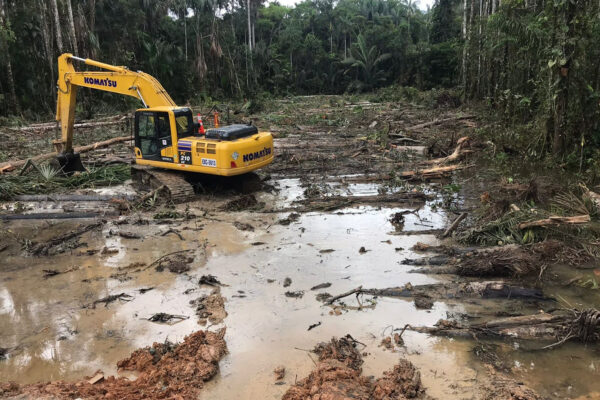Financial Times Series on the ‘Price of Oil’ Far beneath the snow-capped peaks of the Cocuy mountains, half-concealed groups of soldiers watch a helicopter as it flies into a narrow valley.
Dangling below the aircraft are more supplies for Occidental Petroleum, which has been sinking an exploratory well here since November, moving ever closer, it hopes, to one of Colombia’s biggest oil finds. Also observing, having passed an army checkpoint and climbed to the top of a ridge overlooking the US company’s drilling rig, are several members of the U’wa.
This is the ancient territory of the U’wa, now numbering only 5,000-7,000 people and one of Colombia’s 80 indigenous ethnic groups.
They have faced many intrusions, but as they contemplate Occidental’s search for the oil the U’wa know as ruiria, they feel a great threat to their lifestyle and culture. “This is life or death for us. We want the world to know what is happening in U’wa territory,” says Shiwkara, a community spokeswoman.
The U’wa case is emblematic of a David versus Goliath struggle between indigenous groups, global energy needs and corporate power.
Violent clashes last year between the U’wa and the Colombian military protecting the drill site left three children drowned after one of their protests was forcibly broken up, the Uw’a say.
Both Occidental and the government think the U’wa case has become overly influenced and manipulated by outsiders.
But throughout the troubles, Occidental has moved ahead with exploration, sanctioned by the government in Bogotá. “We do not think we are in a conflict here. We are a foreign investor fulfilling our contractual obligations,” a company spokesman said.
It says it is contributing a local health centre, schools and other community projects. It also used to give grants to U’wa students until it says these were rejected. Moreover, it thinks the U’wa have been given one of their most important demands – the expansion of the resguardo, reserved land from which non-indigenous people are excluded.
In 1979 and 1987 the U’wa were granted two separate reservations totalling 69,000 hectares. In August 1999, the government agreed to expand these areas into a 220,000 ha reserve solely for the U’wa.
Six weeks later, it granted Occidental its licence to drill its first exploratory well, at a site 500m outside the expanded resguardo.
Despite their larger territory the U’wa have not been pacified. They argue their lands will still be affected, their streams polluted and their security compromised.
A stark lesson from Colombia is that oil attracts trouble from all sides. Two armed rebel groups active in the country since the 1960s have learned to exploit oil, either through extorting protection money or blowing up installations.
Occidental knows these problems only too well. It built a pipeline through this region in the 1980s to carry oil from its nearby Caño Limon field. Last year the pipeline was blown up 98 times, and 79 times in 1999. Even so, Caño Limon has been “a good business”, says the company.
Moreover, in a complex local power struggle, both the Farc and ELN rebel groups have attacked the pipeline. The Farc has also targeted the U’wa cause, killing three US citizens working with the U’wa in 1999.
The U’wa resent and fear being dragged into Colombia’s military conflict. Roberto Perez, president of the U’wa’s tribal council, says: “We have told the army and all armed groups to respect our territory.”
Meanwhile, economic analysts say attacks already bleed the economy of 2-4 percentage points of growth annually. Even so, oil is Colombia’s biggest export, worth $4.6bn in 2000.
“I think, as a Colombian, that Colombia has to seek means of development,” says an Occidental employee. Ecopetrol, the state oil company, says: “Forty million Colombians need these resources.” The test drill is expected to be completed by May. But the U’wa blame Occidental’s earlier Caño Limon development for environmental damage.
“Ten years ago you could pull fish out of this river with a bucket. This year there has not been one little fish,” says Rosario, one of four nuns living at a mission built in the area in the 1920s.
A government official thinks it would be possible to safeguard the U’wa, even if oil development goes ahead. But, the offical adds: “I would love it if they didn’t find a drop of oil. I would laugh the whole day. Without oil, there is no problem.”













